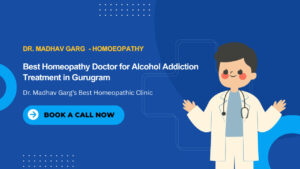As the world reeled under the pressure of the COVID-19 pandemic, many turned to alternative and natural remedies to protect themselves. One such remedy that gained notable attention was homeopathy. While some claimed miraculous recoveries, others dismissed it outright as pseudoscience. So what’s the truth? Does homeopathy actually help with COVID-19—or is it just a placebo wrapped in hope?
Let’s explore what the evidence says, what risks exist, and whether there’s a role—if any—for homeopathy in managing COVID-19.
Looking for safe, natural, and personalized homeopathic treatment? Dr. Madhav Garg, BHMS, is dedicated to holistic healing and patient-centered care at Dr. Madhav Garg’s – Best Homeopathic Clinic in Gurugram. Whether you need expert consultation, customized remedies, or natural solutions for chronic health concerns, Dr. Garg is here to help! Book your appointment today or call ☎ (+91) 084477 93878 to experience the benefits of homeopathy firsthand. Your journey to better health starts here!
What Is Homeopathy?
Homeopathy is a system of alternative medicine founded by German physician Samuel Hahnemann in the late 1700s. It operates on two main principles:
-
“Like cures like” – A substance that causes symptoms in a healthy person can, in highly diluted amounts, treat similar symptoms in someone who is ill.
-
Ultra-dilution – The remedy is diluted repeatedly in water or alcohol, often to the point where no molecules of the original substance remain.
Homeopathic remedies are not herbal medicines. They’re typically diluted far beyond scientific recognition and are sometimes criticized for being nothing more than sugar pills.
Homeopathy and COVID-19: What Happened?
In the early days of the pandemic, when fear and uncertainty were high, various governments and organizations looked for preventive solutions—including natural and traditional options. Homeopathy came into the spotlight in countries like:
- India: The Ministry of AYUSH recommended Arsenicum album 30C as a preventive measure, despite a lack of clinical evidence. Millions of doses were distributed across states.
- Brazil and Cuba: Homeopathy has a long-standing presence in public health systems in these countries. Some doctors administered homeopathic remedies as adjunct therapies, though without scientific endorsement.
- Global Health Authorities: Major organizations like the World Health Organization (WHO) and the Centers for Disease Control and Prevention (CDC) never endorsed homeopathy for COVID-19. Their guidance remained focused on vaccination, antiviral treatments, and public health measures.
What Does the Science Say?
Multiple small-scale studies explored the potential of homeopathy during the pandemic, but most shared common flaws: lack of controls, subjective endpoints, and poor methodology.
Example Studies:
- A 2022 study in India followed 178 patients with mild COVID-19 who received homeopathic care. While most recovered, the study lacked a placebo group and was observational in nature.
- A Cuban trial examined PrevengHo-Vir, a homeopathic complex, but failed to publish rigorous peer-reviewed outcomes.
- A few randomized trials (e.g., using Natrum muriaticum LM2) have been initiated, but as of 2025, no results have shown statistically significant efficacy beyond placebo.
Scientific Consensus:
Most reviews and medical experts conclude that homeopathy is no more effective than placebo for COVID-19. The National Health Service (UK), Australian Medical Association, and European Academies’ Science Advisory Council all strongly discourage relying on homeopathy for infectious diseases.
The Risks of Using Homeopathy for COVID-19
While homeopathic remedies are unlikely to cause direct physical harm due to their dilution, the real danger lies in substitution and misinformation.
Here’s why:
- People may delay seeking real treatment while relying on homeopathy.
- It may foster false confidence, leading to reduced adherence to proven measures like masking or vaccination.
- Some advocates have spread anti-vaccine sentiment, further endangering public health.
What Actually Works Against COVID-19?
By mid-2021, the medical community had identified and approved several effective tools in the fight against COVID-19:
- Vaccines (mRNA, viral vector, and protein subunit vaccines) have saved millions of lives globally.
- Antiviral medications, like Paxlovid and Remdesivir, reduce viral load and severity of symptoms.
- Supportive care for fever, hydration, and oxygen levels is essential for recovery in moderate to severe cases.
- Preventive measures, such as mask-wearing, physical distancing, and proper ventilation, remain vital in high-risk settings.
No major medical authority includes homeopathy in any standard COVID-19 treatment protocol.
Where Homeopathy Might Have a Role
Some patients turn to homeopathy for non-medical relief—for instance, to ease anxiety, insomnia, or general discomfort. In such cases, homeopathy may serve as a comfort measure, especially when used alongside evidence-based treatments.
If used responsibly and with informed consent, homeopathy can act as a placebo support mechanism. But it should never replace medical treatment for COVID-19 or any other serious disease.
Frequently Asked Questions (FAQs)
Is homeopathy effective against COVID-19?
No. There is no high-quality scientific evidence supporting its effectiveness against COVID-19.
Can I take Arsenicum album to prevent COVID-19?
Despite early claims, there is no clinical proof that it prevents infection or improves outcomes.
Is homeopathy safe?
Generally, yes—because the remedies are so diluted. However, relying on it instead of proven medical care can be dangerous.
What does WHO say about homeopathy and COVID-19?
The WHO does not recommend homeopathy for COVID-19 prevention or treatment.
Conclusion
Homeopathy is not a scientifically validated treatment for COVID-19. While it may offer psychological comfort or help with stress-related symptoms, its role is supportive at best and harmful at worst—especially when it replaces proven medical care.
If you’re considering homeopathy for any reason during or after a COVID-19 infection, consult a licensed healthcare provider. Above all, follow public health guidelines, get vaccinated, and trust therapies backed by rigorous science.









